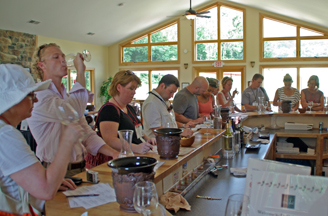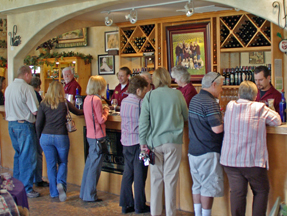Ask Questions While in a Tasting Room
by
Terry Sullivan
Ask questions. Early in life while in high school I attended a lecture on the MoHo Discontinuity. The science has faded over the decades, however a couple things the lecturer stated has made an impact for a lifetime. Bascom told the high school student audience that there is no such thing as a stupid question, only stupid answers. He went on to tell the attendees that if they really wanted to learn about a subject, they should write a book about it. Those two statements have provided a lifetime of guidance.
 In a thirst for wine knowledge, more people are visiting winery and vineyard tasting rooms. One way to learn about wine is to taste and drink wine. At tasting rooms, one can often sample several wines from the winery’s portfolio. This is an informal experience and is ripe for asking questions. Try asking the same question at different tasting rooms and notice if the answers vary. For example, one may not know about French wines and ask if all Burgundies are red. Compare answers. One’s wine knowledge will increase with the more questions asked.
In a thirst for wine knowledge, more people are visiting winery and vineyard tasting rooms. One way to learn about wine is to taste and drink wine. At tasting rooms, one can often sample several wines from the winery’s portfolio. This is an informal experience and is ripe for asking questions. Try asking the same question at different tasting rooms and notice if the answers vary. For example, one may not know about French wines and ask if all Burgundies are red. Compare answers. One’s wine knowledge will increase with the more questions asked.
For those beginning on their wine journey, asking questions may be a challenge. People often do not ask because they are afraid of appearing ignorant. Ask questions. While visiting a winery in Michigan, another winery visitor asked why I was swirling the wine in my glass. Launching into teacher mode, I explained why and had him smell his wine, swirl and smell again. Ask questions not only of the tasting room staff, but start a dialogue with the other visitors next to you.
 Some tasting room staff are better with novice wine drinkers than others. One of the staff members at Virginia’s Rappahannock Cellars told a story about a “Hell’s Angels type” that rode up on his motor cycle five minutes before closing. Clad in leather jacket with chains rattling, the visitor was asked if he wanted to taste a wine. He responded with yes and was poured a sample. Taking the glass, he swung back his head and swallowed the wine in one gulp. The astute tasting room employee asked, “Would you like me to demonstrate another way of tasting the wine?” The guest responded with a yes and was shown the steps of a structured tasting. Upon leaving the winery, the leather clad visitor turned and thanked the tasting room staff member citing, “No one ever taught me that before.” Many tasting room staff are quite helpful in moving you along your wine journey.
Some tasting room staff are better with novice wine drinkers than others. One of the staff members at Virginia’s Rappahannock Cellars told a story about a “Hell’s Angels type” that rode up on his motor cycle five minutes before closing. Clad in leather jacket with chains rattling, the visitor was asked if he wanted to taste a wine. He responded with yes and was poured a sample. Taking the glass, he swung back his head and swallowed the wine in one gulp. The astute tasting room employee asked, “Would you like me to demonstrate another way of tasting the wine?” The guest responded with a yes and was shown the steps of a structured tasting. Upon leaving the winery, the leather clad visitor turned and thanked the tasting room staff member citing, “No one ever taught me that before.” Many tasting room staff are quite helpful in moving you along your wine journey.
The Del Dotto Estate Winery and Caves in St. Helena does a nice job with visitors on their tours. They have visitors taste wines from barrels and turn it into a educational experience. For example, visitors tasted a wine in American oak and the same wine in French oak. Our guide asked who in the group preferred the American and who preferred the French. The group was divided. A visitor can quickly understand that there is not a right or wrong answer. Tour guides and tasting room staff that asks questions can guide visitors.
Visit several winery tasting rooms and ask the same question until you notice the same answer several times. You can also research the answer to your question. Don’t always take for truth an answer. There are occasional tasting room staff that are ill-informed. While traveling along Virginia Route 29, a tasting room employee at a winery proudly stated to several guests that Virginia has almost as many wineries as California. To most people 200 wineries is not almost as many as 3,000 wineries. In Texas a young tasting room staff member was giving a group tour of the vineyards and winery. He mentioned that American oak barrels are much larger than French oak barrels. In another occurrence, being not telling an untruth but not helpful either, an older gentleman pouring wine at a tasting room on Long Island, New York stated, ‘Don’t ask me any questions. I just pour the wines and don’t know anything about them.” Some tasting room staff members need to also learn about wine.
As you ask questions about wine and collect answers, you’ll add knowledge to your wine journey. Together with tasting and drinking wines, this knowledge will continue to build and you’ll find yourself thirsting for even more wine knowledge. It’s easy to start, just ask questions. Remember there are no stupid questions, just stupid answers.
